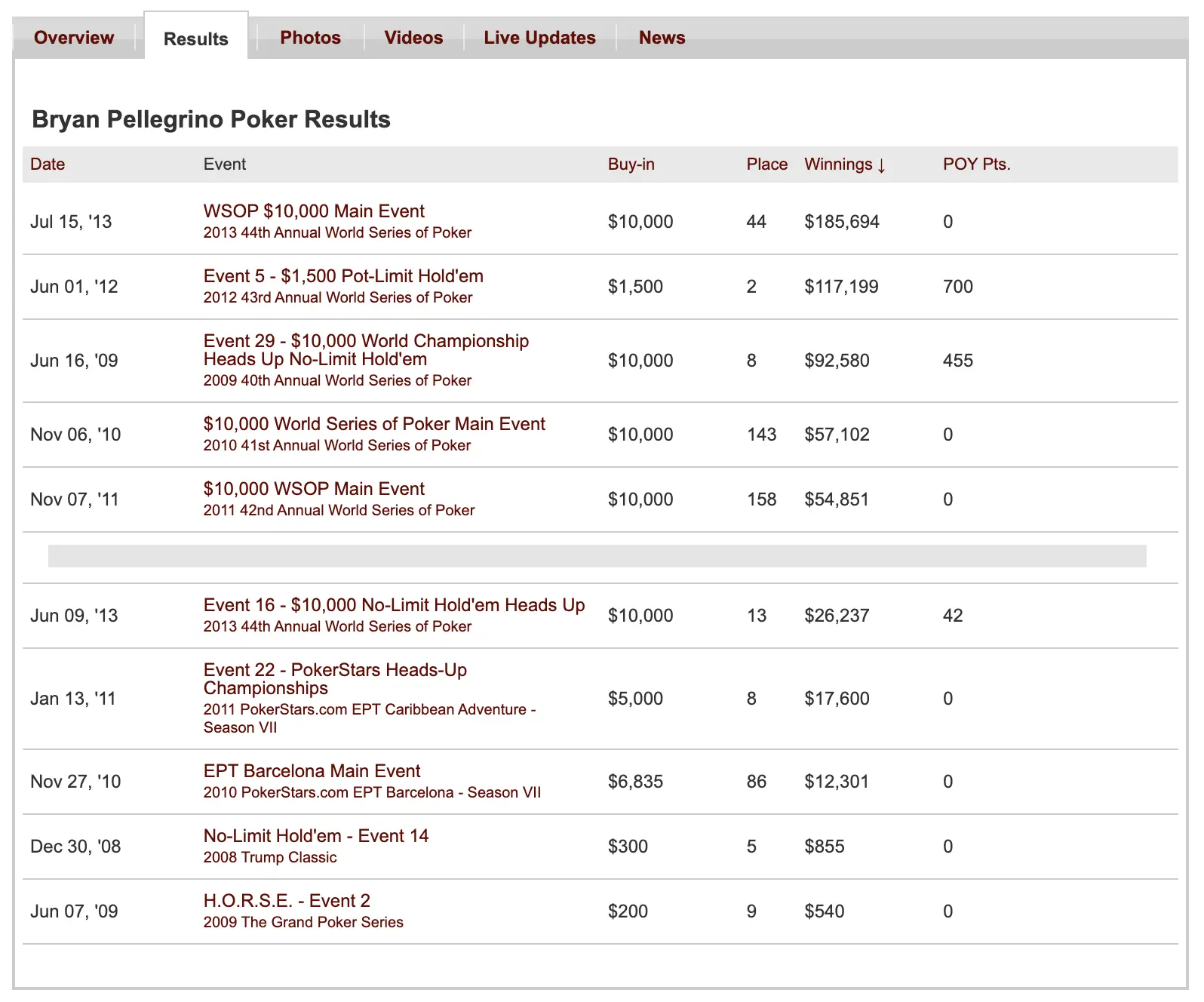Author: Azuma, Odaily Planet Daily
The Witch's Great Purge of LayerZero is intensively underway.
Due to the flexible nature of the cleansing mechanism (employing multiple designs such as "self-exposure," "screening," "reporting," etc.), the extensive cleansing effort (expected to retain only 6.67%-13.33% of addresses), and the precise cleansing strategy (able to deduce more witches based on the behavior patterns of self-exposed addresses), Bryan Pellegrino, the founder of LayerZero, also known as the "Stinky Penguin" in the community, has been dubbed the "Master of Human Nature."

Little known is the fact that even before founding LayerZero, Bryan had already demonstrated astonishing talent in human psychology and strategy. Between 2009 and 2013, under the alias "PrimordialAA," Bryan was once considered one of the most promising newcomers in the professional Texas Hold'em poker arena.
In 2009, Bryan achieved an impressive 8th place in the $10,000 buy-in event at the 40th World Series of Poker (WSOP), earning $92,580. In 2012, Bryan secured 2nd place in the $1,500 buy-in event at the 43rd WSOP, winning $117,199.

Although he later left the professional poker scene to seek "an interesting challenge," we can still find records of Bryan's glorious achievements in professional poker player databases such as Poker Hendon Mob—his total earnings from formal offline tournaments amounted to $569,647, with a highest historical ranking of 1859 and a current ranking of 5097.
In 2013, the poker media Card Player conducted a special interview with Bryan. In that interview, Bryan elaborated on his expertise in one-on-one strategies, explaining his decision-making process in different opponent situations, hand ranges, chip depths, and pressure to call or raise. His ability to adapt swiftly to the ever-changing poker table environment helps to understand why Bryan has been able to precisely strike in the current "witches in the light, me in the dark" situation.
The Game Genius in the Small Town
Bryan was born in Danbury, New Hampshire, a town with a population of less than 1000 at the time of his birth. As a child, Bryan felt that his relatives were the only people around him, and at the age of 4, he expressed to his mother his desire to go to a place with more "different" interpersonal relationships in the future.
Around the age of 6, Bryan had already shown a certain talent in mathematics. Bryan's family had four children in total, in descending order of age: Deanna, Manie, Bryan, and Angela. Friday and Saturday nights were "game nights" for Bryan's family, where the children would play games like Monopoly and chess. Bryan enjoyed it and almost always won.
During high school, Bryan was introduced to Texas Hold'em for the first time. At the invitation of a friend, Bryan used $20 of his pocket money for his first bet. His childhood gaming experience endowed him with a keen sense of risk and strategy. That night, $20 turned into $60, and Bryan used some of the money to buy himself a Georgetown University sweatshirt, giving the rest to his father to help set up an online account.
Despite being immersed in playing cards during high school, Bryan still performed well academically, ranking third in his class upon graduating from high school. Due to financial considerations, Bryan ultimately chose the University of New Hampshire in his home state, where he met two friends, Zarick and Banister, who later became the co-founders of LayerZero.
At the age of 19, at the insistence of his brother-in-law, Bryan applied for an overseas study program in Budapest, Hungary. There, Bryan not only met his future life partner, Melanie, but also accumulated some money through playing Texas Hold'em online, leading to his decision to drop out of school.
Bryan then communicated to his family, expressing his desire to give himself six months to either become a professional player or return to study computer science. His mother Audrey's response was, "As long as you do no harm and can ensure your safety, you can do anything. If you go bankrupt, you can always come home."
From then until the US banned online poker in 2011, Bryan would spend 70 hours a week playing poker in front of his computer. Even when traveling abroad with Melanie, Bryan would not forget to bring his full-size desktop computer. During that time, Bryan became deeply engrossed in Texas Hold'em, honing his skills and becoming able to make rapid risk and reward decisions based on different situations within 0.3 seconds.
Bryan was living in Austin, Texas at the time, but due to the ban on online Texas Hold'em, he was technically "unemployed." Subsequently, Bryan joined the sports betting website BuzzDraft and became its CEO when the company was soon acquired by another sports betting company. Meanwhile, Bryan also went to Las Vegas, gradually making a name for himself in formal offline Texas Hold'em tournaments and earning substantial profits.
There was also a small episode during this time—around 2013, as Bryan became increasingly wealthy, he encountered Bitcoin for the first time. Subsequently, Bryan and his brothers specifically bought a computer for Bitcoin mining. However, with the sharp drop in the coin price in 2014 and the collapse of the exchange Bryan used (unnamed, but likely Mt.Gox), the investment did not yield the desired results.
Bryan then moved to Canada, where online poker was still legal. While Bryan could continue playing poker online, he gradually found himself becoming more emotionally depressed and less interested in competition, even though that year was supposed to be a crucial turning point in his professional career. Bryan wavered, recalling, "Unlike many other professional players, I am not driven by money, but rather seek more competitive challenges."
Seeking "More Interesting" Challenges
Around 2015, having earned enough money, Bryan briefly considered retiring. He and Melanie took their infant son on a 12-country tour within 12 months, hoping to find a suitable "retirement place." However, during this process, Bryan also realized that he did not want to settle down.
One day, Bryan saw a video on YouTube of a DeepMind AI called Agent57 playing various Atari games. Agent57 would learn the games from scratch and gradually achieve game skills surpassing those of humans. Bryan was very excited about this and, combined with his previous exposure to baseball while working at BuzzDraft, he decided to use AI to create a baseball data analysis tool.
Later, Bryan ended his travels and settled in Vancouver. Although it had been many years since Bryan had regularly written code, he eventually created an AI tool that could predict a pitcher's performance against different batters based on data. In 2016, Billy Beane, a prominent executive of the Oakland Athletics in Major League Baseball, called Bryan to purchase his AI tool to help his team with statistical analysis.
During the same period, Bryan's interest in cryptocurrency grew stronger. At the end of 2016, Bryan personally invested in Bitcoin again; later, in 2018, Bryan and developer Daniel Chen, who had previously worked at a16z, jointly built the coding platform OpenToken to launch a "democratized" cryptocurrency, which was later acquired by another project.
In the field of AI, Bryan achieved another breakthrough in 2020. He, along with Zarick and Banister (the two co-founders of LayerZero mentioned earlier), and Noam Brown from the Facebook AI team, jointly published a research paper describing an artificial intelligence for Texas Hold'em poker called Supremus, which could defeat some top professional players. This paper was later cited in a game theory research paper by the Google DeepMind team.
At the time, Bryan said, "I have always loved solving difficult problems, and nothing attracts me more than this."
The Story of LayerZero
In the fall of 2020, the explosive growth of BSC also caught Bryan's attention.
After seeing BSC's high processing speed and low transaction costs, Bryan brought Zarick and Banister together to build an NFT-based combat game. The game would store NFTs on the more secure and liquid Ethereum network but process transactions on top of BSC.
However, during the subsequent game development process, Bryan and his team found that they had to manually transfer NFTs to some extent. The existing cross-chain bridges at the time either did not support NFTs or were susceptible to hacking.
At this point, Bryan and his team realized that they needed more than just a cross-chain bridge—they needed a foundational code layer that could run on various blockchains and ensure the security of cross-chain bridges. However, such a thing did not exist in the cryptocurrency field at the time.
This was a daunting task, but Bryan became increasingly excited about it—because he had finally found a challenge large enough, the excitement of which surpassed any poker game.
The rest of the story is well known.
In May 2021, LayerZero's initial whitepaper was officially released.
In September 2021, LayerZero completed a $6 million Series A financing round.
In April 2023, LayerZero completed a $120 million Series B financing round at a valuation of $3 billion.
In May 2024, LayerZero officially announced the completion of the first season snapshot and raised the "butcher's knife" to the witches before the official coin launch.
…
According to LayerZero's disclosed timeline, the largest-scale witch cleansing event in cryptocurrency history will end the "self-exposure" phase tomorrow. Bryan, who is adept at human nature, has "fired the first shot" in this game. Let's wait and see how he will proceed in the next round.
免责声明:本文章仅代表作者个人观点,不代表本平台的立场和观点。本文章仅供信息分享,不构成对任何人的任何投资建议。用户与作者之间的任何争议,与本平台无关。如网页中刊载的文章或图片涉及侵权,请提供相关的权利证明和身份证明发送邮件到support@aicoin.com,本平台相关工作人员将会进行核查。



